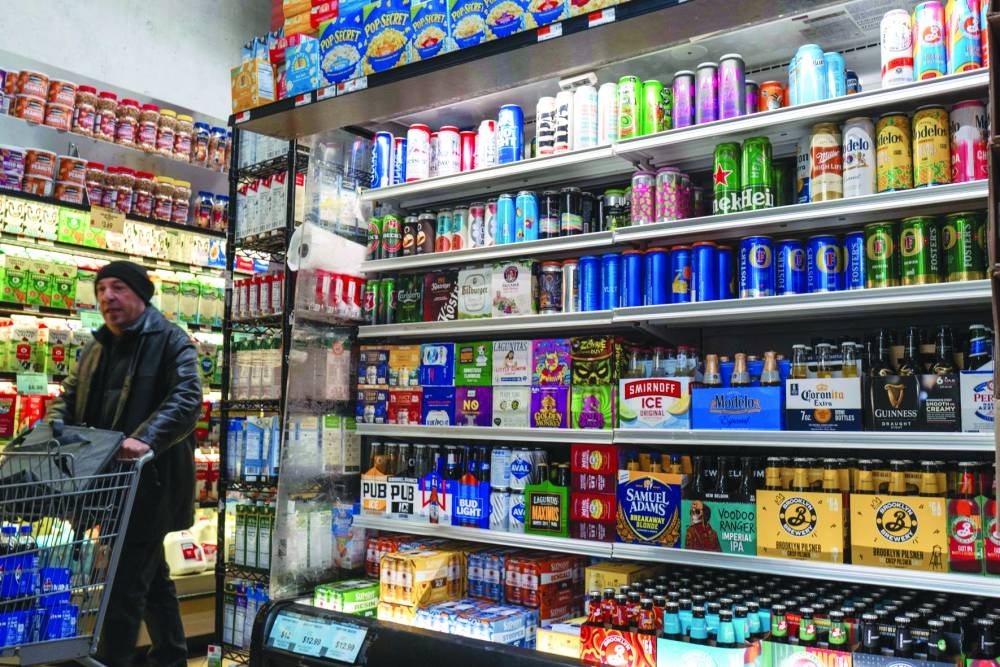The United States’ top government doctor has called for health warnings on alcoholic drinks to highlight that they cause cancer and urged a reassessment of daily consumption limits due to the risks.
Surgeon-General Vivek Murthy said that the connection between alcohol and cancer has been known since the 1980s, with mounting evidence reinforcing the dangers.
Yet, mandatory warning labels continue to fail to address the health threat.
“Alcohol is a well-established, preventable cause of cancer, responsible for about 100,000 cancer cases and 20,000 cancer deaths annually in the US,” Murthy said, emphasising that this toll exceeds the approximately 13,500 alcohol-related traffic fatalities each year.
“Yet the majority of Americans are unaware of this risk,” he added, underscoring the urgent need for public education.
Introduced in 1988, the existing warning label only states that “women should not drink alcoholic beverages during pregnancy because of the risk of birth defects” and that “consumption of alcoholic beverages impairs your ability to drive a car or operate machinery, and may cause health problems”.
Murthy called on Congress to modernise these labels to reflect the now well-established cancer risk, as other countries including South Korea and Ireland have.
He also called for the guidelines on alcohol consumption limits to be reassessed so that people can weigh the cancer risk when deciding whether or how much to drink.
“Alcohol consumption is the third leading preventable cause of cancer in the United States, after tobacco and obesity,” Murthy’s office said in a statement accompanying the new report, adding the type of alcohol consumed does not matter.
His advisory sent shares in alcohol companies including Diageo, Pernod Ricard, Anheuser-Busch InBev and Heineken down, in some cases over 3%.
Alcohol producers and industry associations, did not immediately share comments.
Alcohol consumption raises the risk of at least seven types of cancer, including breast, colorectal, liver, mouth, throat, esophageal, and laryngeal cancers.
For breast cancer alone, alcohol accounts for 16.4% of all cases.
However, public awareness is lagging far behind.
A 2019 survey found that only 45% of Americans identified alcohol as a cancer risk factor, compared to 91% for radiation exposure, 89% for tobacco use, 81% for asbestos exposure, and 53% for obesity.
The new advisory also questioned the adequacy of US dietary guidelines, which recommend a daily limit of two drinks for men and one for women.
Alarmingly, 17% of alcohol-related cancer deaths occur among individuals who stay within these limits, suggesting the need for a reevaluation.
Healthcare providers also have a critical role to play, the advisory noted, by informing patients about the risks of alcohol, offering interventions and providing referrals for treatment as needed.
Alcohol contributes to cancer through four key mechanisms.
It metabolises into acetaldehyde, which damages DNA; it induces oxidative stress, harming DNA, proteins, and cells; it disrupts hormone levels, including estrogen, which increases breast cancer risk; and it heightens absorption of carcinogens, including from tobacco.
It is unclear when or if the surgeon-general’s suggestions will be adopted.
US President Joe Biden’s administration is entering its final two weeks.
Murthy could be succeeded by Janette Nesheiwat, a director of a New York chain of urgent care clinics and President-elect Donald Trump’s pick for the role.
Trump, whose brother died from alcoholism and who does not drink himself, has long warned about the risks of drinking.
Robert F Kennedy Jr, Trump’s nominee for secretary of health and human services, has been open about his past struggles with heroin and alcohol, and says that he attends Alcoholics Anonymous meetings.
The decision to update the label will ultimately be made by Congress.
Murthy’s advisory harks back to early US Surgeon-General action on tobacco, starting with a 1964 report that concluded smoking could cause cancer.
The report kicked off decades of increasingly strict regulations, starting with US laws on warning labels one year later and still ongoing today.
Analysts however pointed out that cigarette warning labels did little to curb smoking and ingrained habits are hard to change.
“Warning labels won’t be an immediate deathblow to alcohol makers, but it will compound the long-term threats to the industry,” said Blake Droesch, analyst with eMarketer.
Public health bodies like the World Health Organisation (WHO) are also increasingly turning their attention towards alcohol after making progress on stronger tobacco controls.
The WHO says there is no safe level of drinking and that even a small amount of alcohol can harm health – a position that has prompted tense debate around the impact of moderate drinking and its role in society.
Bruce Scott, president of the American Medical Association, welcomed the surgeon-general’s effort to make the link between alcohol and increased cancer risk clear.
He said, coupled with a push to update warning labels, it could “bolster awareness, improve health and save lives”.

Beer cans are seen in a grocery store in Brooklyn, New York City. – AFP
